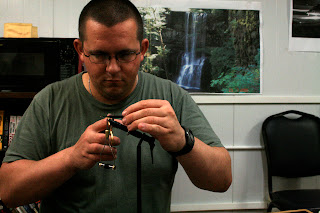Here is another unpublished gem from the archives.
From Iraq to Rock
The driver swears his undying love for Lady Gaga, we break into laughter and that’s when something explodes beneath us. The armored hummer swerves to the right. The truck commander immediately radios the rest of the convoy that we’ve got a flat tire. Suddenly the other vehicles encircle us and the tire is changed instantly as if we were at a NASCAR race, but the mechanics wear armor, their large black M4s strapped over their sweaty backs. The tire change is a relatively small glitch if we were at home, but in a war zone it should feel ominous. I try not to laugh, but here I am a journalist, in the middle of the desert and the biggest news I’ve had in weeks is this, a flat tire and I can’t even get out of the vehicle. I’ve agreed to sit in my seat unless told otherwise. As we pull away from the side of the road, just minutes later, and onto the endless stretch of road, I wonder if I should feel something more?
I spent eleven months in Iraq. My mind labored there in the monotony of concrete walls, barbwire and the endless anxiety of a war zone. I returned home to the organized manicured lawns and children riding bikes under leafy oak trees. I missed the possibility of something happening. Some of us search for lost thrills in drugs, alcohol or fist fights. My self-medication is rock climbing. Don’t get me wrong, I’m no hardcore free solo climber, all it takes is seventy feet and some slab to freak me out, but I love it. So when a friend I made in Iraq, invited me on a climbing trip, I said yes.
We start the climbing trip driving in the darkness. It’s February and Darrell’s headlights reveal the Joshua trees standing with hairy arms adorned reaching into the sky. The vegetation offers a needed distraction. Three of us, freshly returned from a year in Iraq are boring Garrett, a recent biology graduate from Montana, about our war stories. Natalie, a MEDEVAC Blackhawk pilot, Darrell, a MEDEVAC Blackhawk crew chief and I have complaints. The list includes soggy vegetables in the chow hall, aircrafts landing outside of the designated lines, creepy men and temper tantrums. We haven’t seen much blood and gore, but we’ve been isolated, cut off from our familiar worlds.
My year as an embedded journalist with a medevac unit came with its thrills of running to the concrete bunker when mortars came in. Breaking news stories were far and few in between. When they did occur the military had plenty of rules. “You can write the story, but you can’t take pictures on the flight line, in the hospital or of the patient,” I heard often.
The horrors of our deployment were subtle, full of walls, not just the concrete barricades or the thin walls of the trailers we called home, but also the walls we built to keep others out. Darrell says it wasn’t that bad, perhaps he is tougher than I, or perhaps his time in Afghanistan helped him appreciate real suffering. Later in the week of our climbing trip, as I watch him scale a difficult 5.12 (climbing grades typically range from 5.5, for beginners, to 5.15, only climbed by the few) gracefully stretching his arms out to maneuver each move, he appears to be the real embodiment of Darrell, while the person I palled around with in Iraq was a mere ghost.
Darrell and everything else in Joshua Tree National Park, California is more alive than anything in Iraq. Green and reddish shrubbery fill up the empty wide spaces. Huge monuments of rock jut out in all sorts of directions as if some great giant boy placed them like building blocks and they could be knocked over at any time. My first climb is not exactly graceful. I’m clumsy, unsure of my steps.
Over the next few days we travel to Red Rocks, Nevada. “I should just do it,” I say, working up the courage to lead a route. (Lead climbing is when the climber is above the rope clipping into anchors along the way, opposed to top rope climbing when the climber is attached to a rope, attached to an anchor overhead.) “I just lived in a war zone for the last year. I can do it, I think,” I say. Up, up, up I go, leg shaking, breath cramped inside my ribcage and my heart like a little bird flutters. Afterward, with my feet back on the earth, I say, “That was fun.”
Four days later I finally feel comfortable again on rock. I ascend an easy 5.8 route. Halfway up, I reach between my legs and pull up the rope into my teeth. I fumble with the quick draw (consisting of two metal carabiners connected to a piece of webbing), which hangs on a bolt almost out of my reach. Just as I push the rope safely inside the carabiner, my foot slips ever so slightly and a gust of wind knocks a contact lens out of my eye. “I don’t think I can do this,” I yell down to Natalie, my belayer. “I can’t see.”
“You’re doing great,” she yells. I finish the climb and without depth perception, feeling the rock below with my fingers before stepping up. An hour later, back in the warmth of the van, we talk about our favorite climbs. By now all discussions of Iraq have dissolved in lieu of more entertaining topics.
Several days later I am home with a nagging sense of depression. The fear and excitement is gone. I ride my bike in the rain, downhill without the braking. For a short moment I feel alive again. I start to look for my next job, my first location choice, Afghanistan.
